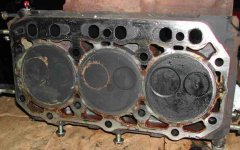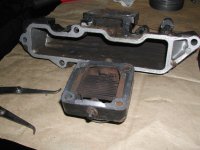He's correct. Diesel fuel is added AFTER the air is preheated by compression. In a spark ignition engine, the fuel mixture is BURNED with a flame front advancing from the spark location.This is non sense!
IF the mixture happens to ignite by compression before the spark starts the burn, it's called 'knock'. And if this occurs before the piston reaches TCD, the extra load trying to reverse the piston early can deform bearings and crack pistons or damage head gaskets. I've even seen a connecting rod fail as if the engine had hydro locked.

